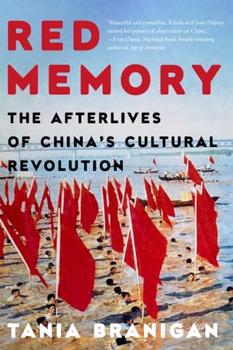Summary | Excerpt | Reviews | Beyond the Book | Readalikes | Genres & Themes | Author Bio

The Afterlives of China's Cultural Revolution
by Tania Branigan
'Of course, I was responsible. It's only a question of how big or small my responsibility was.'
Big enough that, all this time later, he'd devoted five years to these giants, spending days on his ladder to define a hairline, shape a brow. Each of Xu's subjects had played a part in this madness, as victim or perpetrator; often both. Some of them had whipped up rage and hatred. Others had died in the struggles. Painting them helped him take responsibility, he said; they were tied to that first picture, for which he still felt guilty, but which had helped him to understand how people could turn upon each other. He thought that others, seeing his work, might begin to understand too.
Modern China had bred outspoken artists, fond of provocative statements – giving the finger in Tiananmen Square; sculpting Mao riding bareback on a pig. Xu was not interested in provocation, or statements. He didn't satirise forced demolitions, boast of eating foetuses or simulate sex. He held a good position at one of China's most prestigious universities. His very medium, oil painting, was conservative. Even once I'd heard about his childhood, his commitment to the portraits was surprising – almost peculiar. He hoped that one day they could hang in a museum, confronting browsers who might, perhaps, be forced into reflection, and in facing their past help their nation to move forward. But the difficulties of his project were encompassed by its title, the careful Chinese Historical Figures with its telltale addendum, 1966–76. Those were the dates of the Cultural Revolution: the decade of Maoist fanaticism which saw as many as 2 million killed for their supposed political sins, and another 36 million hounded. They were guilty of thoughtcrimes: criticism of Mao or the Party or its policies, or remarks that might be interpreted that way. Others, like Xu's teacher, were guilty by blood, their parentage enough to condemn them. The hysteria, violence and misery had forged modern China, but the movement was rarely mentioned these days. It was not utterly taboo, like the bloody crackdown on Tiananmen Square's pro-democracy protests in 1989. In the past it had been discussed more widely, although never freely. But by the time I arrived in 2008 it dwelled at the margins, biding in the shadows. Fear, guilt and official suppression had relegated it to the fringes of family histories and the dustiest shelves of records.
Xu had been able to show the pictures together just once, in Beijing, a few years before – 'a ghostly experience,' recalled Carol Chow, the daughter of one of the subjects. She had stood face to face with the father she could not remember, the father who had died in the tumult, now painted like a memory, as though he were frozen in time. After all I had heard, I wanted to see him too. Xu brought out the picture at my request: I saw a handsome young man in a fur-trimmed jacket, with quizzical eyes and the hint of a smile upon his confident face – too confident, perhaps. Zhou Ximeng came from a long line of distinguished scholars and himself excelled at every stage, topping the class throughout his studies. For centuries, education had been the key to social advancement in China. In the Cultural Revolution it could mean ruin. To stand out was not an advantage. A mob of Red Guards, Mao's youthful political vigilantes, seized him for a passing comment, holding him prisoner in a village not far from Beijing. He was twenty-seven, recently married and newly a father, but his daughter believed he had reached a point where his life seemed beyond his control. 'You had to first renounce yourself, and then renounce your family and friends. I think, when he got to that point, really, he just closed up.'
Chow, then just a few months old, would never see him again. Her father would briefly escape his captors, to throw himself in front of a train. Three decades later his mother would kill herself too. The night before, the family heard her call out in her sleep: 'Ximeng, Mummy's coming –'
Excerpted from Red Memory by Tania Branigan. Copyright © 2023 by Tania Branigan. Excerpted by permission of W.W. Norton & Company. All rights reserved. No part of this excerpt may be reproduced or reprinted without permission in writing from the publisher.
Analyzing humor is like dissecting a frog. Few people are interested and the frog dies of it.
Click Here to find out who said this, as well as discovering other famous literary quotes!
Your guide toexceptional books
BookBrowse seeks out and recommends the best in contemporary fiction and nonfiction—books that not only engage and entertain but also deepen our understanding of ourselves and the world around us.